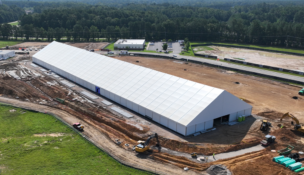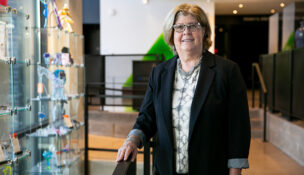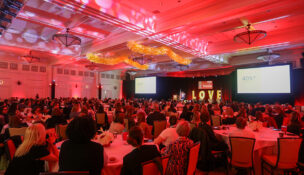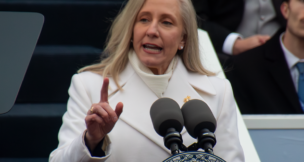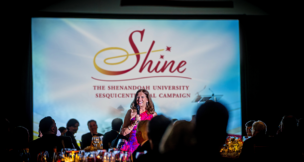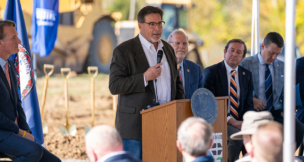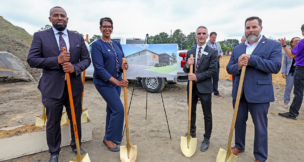Coming to town
Event venues emphasize unique services, area attractions

More than 2,000 fire and rescue workers attended the Virginia Fire Rescue Conference in February at the Virginia Beach Convention Center. Photo courtesy Virginia Fire Chiefs Association

More than 2,000 fire and rescue workers attended the Virginia Fire Rescue Conference in February at the Virginia Beach Convention Center. Photo courtesy Virginia Fire Chiefs Association
Coming to town
Event venues emphasize unique services, area attractions
People who attended the annual Virginia Fire Rescue Conference in February could buy the latest rescue equipment, tools, turnout gear, radios, oxygen tanks — even a 30,000-pound pumper fire truck.
“If you’ve got your checkbook … you can drive that truck home,” says Christian Eudailey, executive director of the Virginia Fire Chiefs Association, which organizes the conference every winter in Virginia Beach.
More than 2,000 fire and rescue personnel flooded the Virginia Beach Convention Center’s 150,000 square feet of indoor space during the six-day conference. The association budgets about $425,000 for the event to cover expenses like facility rental, audiovisual needs and staff lodging.
Event attendees booked about 2,000 room nights across a week this year. The association’s budget doesn’t include meals, tourism activities or nights on the town for the attendees, many of whom bring spouses and family with them.
“The restaurants see a real uptick in their business” when the convention is in town, Eudailey says. “You’ve got a lot of hungry firefighters who like to eat.”
Conventions such as the Virginia Fire Rescue Conference clearly bring dollars to Virginia Beach, but the extent of economic impact delivered by those kinds of events hasn’t been fully measured in Virginia. That will change soon, as the Virginia Tourism Corp. was set to release the results of a study, the Economic Impact of Meetings in Virginia, conducted with global travel research firm Tourism Economics, in late October, after this story went to press. The study was expected to show that convention business provides a substantial economic benefit to communities, a benefit that seems to have eclipsed pre-pandemic levels of visitor spending.
Dan Roberts, VTC’s vice president of research and strategy, says in-person business gatherings and conferences are increasing in number, easing fears among tourism officials that the pandemic had permanently shifted the landscape away from large-scale, in-person meetings for businesses and other organizations.
“Back in 2020, people asked if business travel would ever come back,” Roberts says. “It’s coming back in earnest.”
Conventions are big business, even if they’re not business-related. In Richmond, the sci-fi and fantasy-themed GalaxyCon brought 33,000 people to the Greater Richmond Convention Center over three days in March, providing a $2.86 million economic boost, according to GalaxyCon founder and President Mike Broder.
The 25-year-old downtown Richmond convention center, the largest in the state at 700,000 square feet, hosted 218 events in fiscal 2023, up 21% from the previous year. That’s according to the authority that manages the facility, an organization created by the governments of the City of Richmond and Chesterfield, Hanover and Henrico counties.
A booming business
Arlington County’s Convention and Visitors Service worked with groups that added as much as $32 million to the local economy. That number, however, is just the business that the convention service’s two-person team handled themselves. The county has no general convention center, relying instead on four major hotels and other venues for much of its convention traffic, which means getting total economic numbers is nearly impossible.

“It’s hard to wrap your arms around it all because the hotels are so competitive among themselves that they don’t want to share which conferences they got, [or] how many room nights they were booked,” says Portia Conerly, Arlington Convention and Visitors Service’s sales director. “Because the minute that’s out there, then everyone’s pouncing on that opportunity for the next time.”
Convention business is booming in Northern Virginia, though, where Roberts and other tourism officials say that competition among hotels and municipalities is driving growth in weeknight lodging stays by convention attendees, a sign that people are arriving at convention sites earlier and staying longer.
From Virginia Beach to the Blue Ridge Mountains, organizations are gathering in groups that range from a few dozen to thousands.
“Virtual meetings are not going anywhere, but face-to-face experiences are what people are looking for,” says Roxana Rivera, Arlington Convention and Visitors Service’s destination sales manager. “That’s where the opportunities are, and people are realizing that. And we are able to see that with the number of meetings and events that keep going up.”
Northern Virginia lost much of its travel business during the pandemic, when companies and organizations significantly reduced their in-person gatherings, a market that took longer to rebound than leisure travel.
“It’s been a long recovery,” Roberts says. “The conventions and meetings market was the hardest hit, and it’s been hard to come back.”
The economic impact of meetings comes in two primary ways, he says: visitor spending and operational spending. Visitors benefit the economy by spending money on items such as meals, lodging, transportation and retail within a locality. The impact of operational spending comes from money that supports a conference venue and its workers, as well as meeting planners, audiovisual professionals and people in other roles.
“That is a huge piece of this,” Roberts says of operational spending. “It’s a massive chunk of change.”
Standing out
The needs of convention planners vary, but one of the most basic is the need for space, whether for their members or exhibitors.
“I need a place where I can drive a 60,000-pound ladder truck onto a floor that can hold it,” says Eudailey, the retired Spotsylvania County fire chief who has planned the fire and rescue conference the past 11 years. His group and associated vendors and trainers fill nearly every inch of the vast Virginia Beach center every February.
Space, and the need for lots of it, was the final frontier for GalaxyCon, which landed in Richmond for the first time in 2019. The organization’s Raleigh, North Carolina, convention attracted attendees from Virginia, which prompted organizers to expand into the commonwealth, says Broder, GalaxyCon’s founder. Organizers knew they needed a massive facility to contain more than 30,000 fans, plus vendors.
“There was no large-scale Comic Con event in the area,” Broder says. “Richmond is a vibrant and growing city with a strong student population, which is important to us. The convention center is large enough to host an event like ours. Anything smaller would be challenging, which made it more attractive than some other convention
centers in the region.”
Convention planners now look beyond basic amenities such as large rooms, food, high-speed internet, audiovisual capabilities and other standard fare at convention facilities. These days, event planners want unique experiences for their attendees, often leavened by special requests of host venues.
Groups and businesses want to know what kind of sustainable practices a facility employs, from recycling waste to using renewable energy sources to being LEED-certified. Planners want to know if disabled attendees will be properly accommodated, or if the venue recommends recreational or even community service opportunities for visiting members.
One group that held its convention in Arlington even requested that a local animal shelter provide puppies for their members to play with during breaks.
“Meetings can be a little hectic,” says Arlington’s Conerly, who has found herself playing chief puppy wrangler for visiting conventioneers. “They want to get everybody relaxed again, which I think is cool, so they want to know about those things.”
Added benefits
In Roanoke, regional visitors bureau Visit Virginia’s Blue Ridge pushes outdoor recreation as a way to attract out-of-town meetings to venues such as The Hotel Roanoke & Conference Center and the Berglund Center. VBR promotes the Roanoke Valley’s hundreds of miles of hiking and mountain biking trails, kayaking and canoeing on the Roanoke River, and more than 20 miles of paved greenways as reasons to meet in the Star City.
“Everyone has a convention center, and when you’re inside, you could be in Virginia or in Utah or New York, because they look the same,” says John Oney, VBR’s vice president of sports and sales.
“How do we differentiate ourselves? For us, it’s outdoor recreation. … It gets a meeting planner fired up when you tell them you can take e-bikes on a brewery tour,” he adds.
VBR hosted 40 events in the Roanoke Valley, creating an $11 million local economic impact in fiscal 2023, but Oney says perhaps 100 or more other large meetings take place in Roanoke. In addition to spending money in the city, some conference attendees perform community service; some groups have volunteered at Roanoke’s Mill Mountain Zoo while in town.
Wytheville, a town of 8,100 right in the Blue Ridge Mountains, opened its own meeting center in 2007 to take advantage of its location at the intersection of interstates 81 and 77, which makes it a convenient meeting spot for groups from a four-state region. The site hosts about 750 events a year, both large and small.
“One of our biggest attributes is our location,” says Shane Terry, Visit Wytheville’s social media and marketing projects coordinator. “We get a lot of overnight stays and
we work with approved caterers, so the meals tax alone makes a lot of economic impact.”
If anything, convention hosts aren’t just selling a facility to hold a meeting. They are also selling their towns and cities and regions to potential businesses and residents, says Emily Cassell, director of the Arlington Convention and Visitors Service.
“We think about every visitor and every meeting and group that comes here as a potential entrée into economic development,” she says. “They see our neighborhoods. They see our food scene, our art scene. … All of those other assets that our community offers are a potential motivator for later business investment, or for a company move or a company expansion. That’s something unique in Arlington, that really tight connection between tourism and
economic development.”





